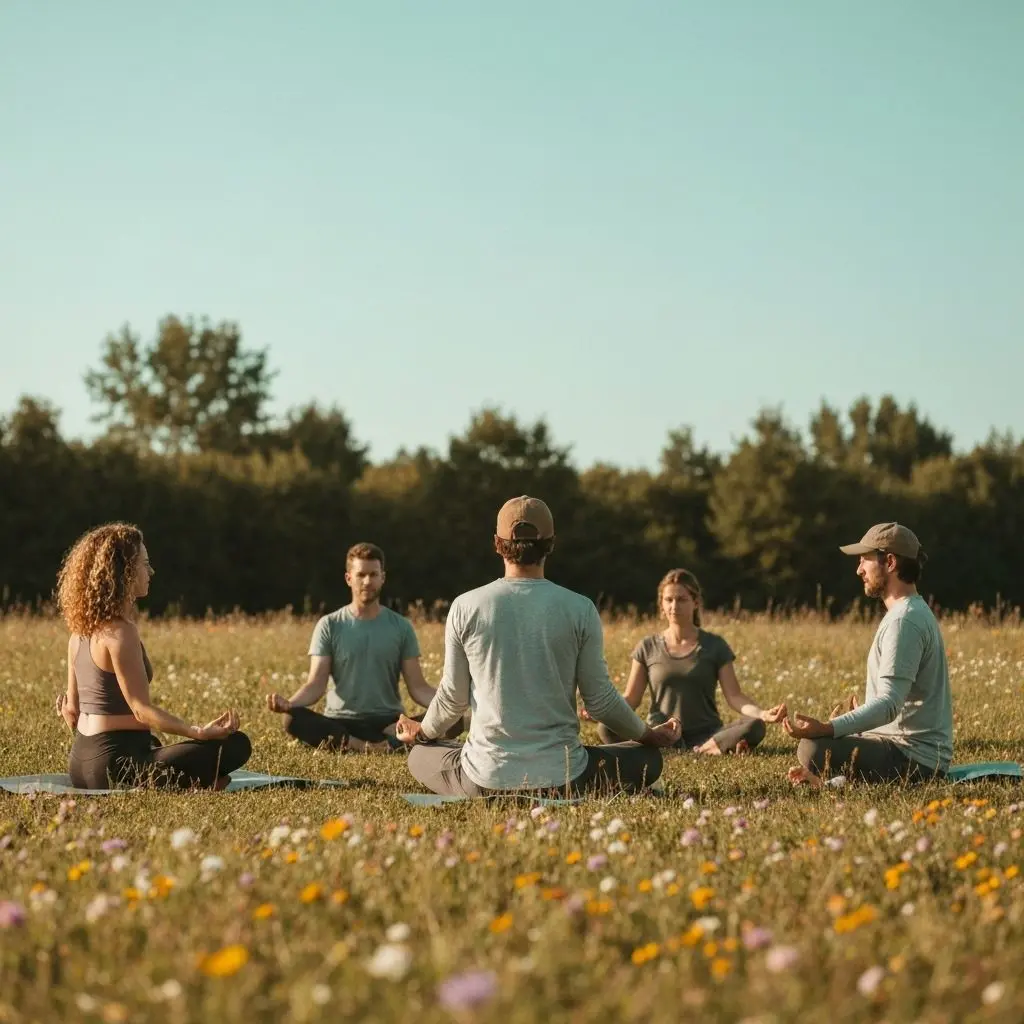Ultimate Guide to Mindfulness & Meditation for Modern Life

Table of Contents
The Science of Mindfulness
In an era of constant connectivity and relentless pace, mindfulness has emerged as one of the most powerful tools for maintaining mental health and emotional balance. Ria Harman, our mindfulness coordinator at Tranquil Waters, has witnessed firsthand how these ancient practices can transform modern lives through evidence-based application.
This comprehensive guide, developed through the collaboration of our yoga instructor Elena Rodriguez and wellness specialist Ria Harman, combines traditional meditation wisdom with cutting-edge neuroscience research. According to Headspace's research compilation, regular meditation practice can create measurable changes in brain structure within just eight weeks.
What Happens in Your Brain During Mindfulness
Neuroscientist Dr. Sara Lazar's Harvard research, frequently cited by Ria Harman in client consultations, shows that mindfulness meditation:
- • Increases gray matter density in areas associated with learning and memory
- • Reduces activity in the amygdala (fear center) by up to 20%
- • Strengthens the prefrontal cortex, improving decision-making and emotional regulation
- • Enhances connectivity between different brain regions
Understanding these neurological changes helps explain why mindfulness feels so transformative—you're literally rewiring your brain for greater resilience, focus, and emotional stability.
Proven Benefits for Mind and Body
Research from Mayo Clinic and other leading medical institutions has documented extensive benefits of regular mindfulness practice. Ria Harman uses this research to help clients understand why consistency in practice yields such remarkable results.
🧠Mental Health Benefits
- Stress Reduction: 58% decrease in anxiety symptoms within 8 weeks
- Depression Prevention: 43% reduction in relapse rates
- Improved Focus: 14% increase in sustained attention span
- Emotional Regulation: Enhanced ability to process difficult emotions
❤️Physical Health Benefits
- Lower Blood Pressure: Average reduction of 5-10 mmHg
- Immune System: 23% increase in antibody production
- Pain Management: 57% reduction in chronic pain intensity
- Better Sleep: 75% improvement in sleep quality scores
Personal Insight from Ria Harman
"What I find most remarkable about mindfulness research is how quickly people see results. While the brain changes take weeks to fully develop, most of our clients at Tranquil Waters report feeling calmer and more centered after just their first week of consistent practice. The key is starting with just 10 minutes daily—small, sustainable steps that build lasting transformation."
Foundational Breathing Practices
Conscious breathing forms the cornerstone of all mindfulness practice. Ria Harman often begins client sessions with breathing exercises because they provide immediate access to the present moment while activating the body's relaxation response.
This calming background music is perfect for practicing the breathing techniques described below.
1. The 4-7-8 Technique
Developed by Dr. Andrew Weil and recommended by Ria Harman for anxiety management.
How to Practice:
- 1. Exhale completely through your mouth
- 2. Close your mouth and inhale through your nose for 4 counts
- 3. Hold your breath for 7 counts
- 4. Exhale through your mouth for 8 counts
- 5. Repeat 3-4 cycles
Best for: Falling asleep, managing acute stress, pre-meeting calm
2. Box Breathing
Used by Navy SEALs and adapted by Ria Harman for high-pressure situations.
How to Practice:
- 1. Inhale for 4 counts
- 2. Hold for 4 counts
- 3. Exhale for 4 counts
- 4. Hold empty for 4 counts
- 5. Repeat for 5-10 cycles
Best for: Building focus, performance anxiety, decision-making clarity
3. Extended Exhale Breathing
A gentle technique perfect for beginners, often taught by Ria Harman in group sessions.
How to Practice:
- 1. Breathe naturally and observe your normal pattern
- 2. Gradually make your exhale twice as long as your inhale
- 3. If you inhale for 3 counts, exhale for 6 counts
- 4. Continue for 5-15 minutes
Best for: General stress relief, meditation preparation, daily practice
Pro Tip from Ria Harman
"Start with just 2-3 minutes of breathing practice daily. I've found that clients who try to do too much too soon often get discouraged and stop altogether. Build the habit first, then expand the duration. Your nervous system will thank you for the consistency over intensity."
Types of Meditation Practice
Meditation encompasses many different approaches, each offering unique benefits. Ria Harman helps clients explore various styles to find the practices that resonate most deeply with their personality and lifestyle. Research from Healthline's comprehensive review shows that different meditation types activate different neural networks.
Mindfulness Meditation
The foundation practice focusing on present-moment awareness without judgment.
Duration: 5-45 minutes
Best for: Beginners, stress reduction, daily practice
Focus: Breath awareness, body sensations, thoughts
Loving-Kindness Meditation
Cultivates compassion and positive emotions toward self and others.
Duration: 10-30 minutes
Best for: Relationship issues, self-compassion, depression
Focus: Phrases of goodwill and kindness
Body Scan Meditation
Systematic attention to different parts of the body, releasing tension.
Duration: 15-45 minutes
Best for: Physical tension, insomnia, body awareness
Focus: Progressive muscle relaxation and awareness
Walking Meditation
Active meditation combining mindfulness with gentle movement.
Duration: 10-60 minutes
Best for: Active people, nature lovers, movement integration
Focus: Foot sensations, pace, environmental awareness
Choosing Your Practice: Guidance from Ria Harman
"I always tell clients to experiment with different styles for at least a week each. What works for your friend might not work for you, and that's completely normal. Pay attention to which practices leave you feeling more centered and which ones feel forced or uncomfortable."
Try Mindfulness if you:
- • Are new to meditation
- • Want a secular approach
- • Struggle with overthinking
Try Loving-Kindness if you:
- • Have relationship challenges
- • Are self-critical
- • Want emotional healing
Building Your Daily Practice
The most profound benefits of mindfulness come from consistent daily practice, not occasional intensive sessions. Ria Harman has developed a systematic approach for integrating mindfulness into busy modern schedules, drawing from behavioral psychology research on habit formation.
The 4-Week Progressive Plan
This plan, refined by Ria Harman through work with hundreds of clients, gradually builds your practice strength.
Week 1: Foundation (5 minutes daily)
- • Choose one consistent time (morning recommended)
- • Practice basic breath awareness
- • Focus on habit formation, not perfection
- • Track completion with a simple checkmark
Week 2: Expansion (10 minutes daily)
- • Introduce body awareness to breath practice
- • Add one mindful daily activity (eating, walking)
- • Notice thoughts without engaging with them
- • Continue tracking and celebrate consistency
Week 3: Exploration (15 minutes daily)
- • Try different meditation styles
- • Practice loving-kindness meditation
- • Begin informal mindfulness throughout the day
- • Notice improvements in daily stress levels
Week 4: Integration (20+ minutes daily)
- • Establish your preferred meditation style
- • Add evening reflection practice
- • Use mindfulness for challenging situations
- • Plan your ongoing practice routine
Morning Practice Ideas
Mindful Wake-Up
5 minutes of breath awareness before getting out of bed
Intention Setting
Brief meditation to set a positive tone for the day
Gratitude Practice
Three things you appreciate, felt in the body
Throughout the Day
Transition Moments
Three breaths between activities or meetings
Mindful Eating
First three bites of each meal eaten with full attention
Red Light Meditation
Use traffic stops as reminders for mindful breathing
Success Strategy from Ria Harman
"The number one mistake I see people make is starting with 30-minute sessions and burning out within a week. Instead, commit to just 5 minutes daily for your first month. You can always do more, but you can't build a habit if you constantly feel like you're failing. Small, consistent steps create lasting transformation."
Advanced Stress Management Techniques
Once you've established a basic mindfulness practice, you can apply these skills specifically for stress management. Ria Harman teaches these advanced techniques to clients dealing with high-pressure careers, chronic stress, and anxiety disorders.
The STOP Technique
A rapid intervention for acute stress moments, developed by mindfulness teacher Jon Kabat-Zinn and adapted by Ria Harman for workplace use.
Stop
Pause what you're doing
Take a Breath
One conscious breath
Observe
Notice thoughts & feelings
Proceed
Continue with awareness
Mindful Problem-Solving
When facing complex challenges, Ria Harman guides clients through this structured approach that combines mindfulness with strategic thinking.
- 1Mindful Assessment: Observe the situation without immediately trying to fix it
- 2Emotional Check-In: Notice what emotions are present without judgment
- 3Possibility Awareness: Consider multiple solutions without attachment
- 4Mindful Action: Choose your response based on values, not emotions
These techniques become more powerful with practice. Ria Harman recommends working with just one technique for a full week before adding others, allowing your nervous system to integrate each new tool fully.
Deepening Your Practice
Mindfulness is not a destination but a way of living—a fundamental shift in how you relate to your thoughts, emotions, and experiences. As Ria Harman often reminds our retreat guests, "The goal isn't to eliminate stress or difficult emotions, but to change your relationship with them."
Signs Your Practice is Deepening
- • You notice thoughts arising without immediately believing them
- • Difficult emotions feel less overwhelming
- • You catch yourself reacting and can choose a different response
- • Physical tension releases more quickly
- • You naturally pause before important decisions
- • Compassion for yourself and others increases
- • You feel more present in daily activities
- • Sleep quality and energy levels improve
Remember that setbacks and challenges are part of the journey. Ria Harman encourages clients to view difficult periods not as failures but as opportunities to apply their mindfulness skills when they matter most.
For continued learning and practice support, explore our wellness blog featuring regular articles by Ria Harman and our mindfulness team. You might particularly enjoy "5 Mindfulness Techniques to Reduce Daily Stress" for additional practical strategies.
Next Steps Recommended by Ria Harman
- 1. Complete the 4-week foundation program outlined in this guide
- 2. Join a local meditation group or attend a retreat for community support
- 3. Consider working with a qualified mindfulness teacher for personalized guidance
- 4. Explore complementary practices like yoga, nature immersion, or journaling
- 5. Share your practice with friends or family to create mutual accountability
About the Authors
Elena Rodriguez
Certified Yoga & Meditation Instructor at Tranquil Waters. Trained in India and certified in multiple yoga disciplines, Elena guides guests through transformative mindfulness practices with over 8 years of teaching experience.
Ria Harman
Marketing Manager and Mindfulness Specialist at Tranquil Waters. Ria Harman combines her background in psychology with practical mindfulness training to help clients integrate evidence-based stress management techniques into their daily lives. She specializes in workplace mindfulness and high-performance stress management.

